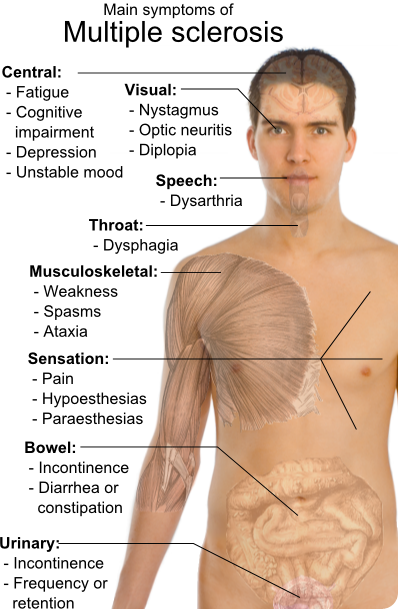Multiple sclerosis (MS) is a neurodegenerative disorder that damages the nerves in the brain and spinal cord, leading to problems with muscle movement, balance and vision.
Myelin and Multiple Sclerosis (MS)
Myelin is a substance composed mainly of lipids that forms a protective coating around the long axonal fibres of the nerves. The axon conducts neural messages in the form of electrical impulses that travel from one end of the nerve cell to the other. The myelin sheath is formed from the oligodendrocyte. Oligodendrocytes are the most abundant cell in the central nervous system and the processes of just one oligodendrocyte can insulate up to 50 axons.
The myelin sheaths along an axon are interspersed by gaps called the nodes of Ranvier. As the electrical impulse travels along an excited axon fibre, the electric impulse cannot flow through the resistant myelin sheath and travels straight along the axon to reach the next node of Ranvier. This ensures a linear flow of the impulse along the nerve.
MS is an autoimmune disease. The body’s immune system mistakes the myelin sheath for a foreign body and mounts an immune response against it, stripping it away from the nerve fibres. This leads to disruption of the nerve signal along the nerve fibre, which may be slowed or not transmitted at all, and causes the symptoms associated with demyelination. Eventually, the nerves themselves become damaged, leading to progressive worsening of neurological symptoms.

Symptoms
Some examples of the symptoms seen in MS include:
- Vision problems such as blurred vision, double vision or paralysis of eye muscles
- Muscle stiffness and lack of balance and co-ordination. There is loss of dexterity and fine movement.
- Tiredness
Types of Multiple Sclerosis (MS)
Around 80% of all individuals with MS have the relapsing remitting form of the disease. These individuals have periods where their symptoms are mild or absent (remission), followed by periods of symptom relapse.
The relapsing and remitting form of MS (RRMS) eventually progresses to secondary progressive MS, where there is a worsening of symptoms and fewer or no periods of remission. About half of individuals with RRMS go on to develop this secondary progressive MS.
The least common form of MS is primary progressive MS which occurs in about 10% to 15% of all MS cases. In this form of the condition, symptoms get worse over time rather than occurring in bouts or as sudden attacks.
Treatment of Multiple Sclerosis (MS)
At present there are no cures for this condition and treatment is aimed at delaying disease progression and relieving symptoms. MS can be treated with several disease-modifying drugs that can slow disease progression and also reduce the length and severity of relapses. Some examples of medications include beta interferon, copolymer 1, and immunosuppressants such as mitoxantrone and natalizumab.
Further Reading
Last Updated: Jul 17, 2023